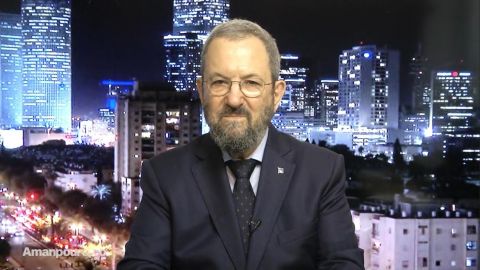Read Transcript EXPAND
CHRISTIANE AMANPOUR, INTERNATIONAL HOST: But first, I want to bring in the former Israeli prime minister Ehud Barak, an army general, former head of the armed services. And welcome back to our program. And it’s really good that we have you because clearly, we want to understand from your unique perspective what the next days are going to look like. What is the objective for a military incursion or this military response to Hamas in Gaza?
EHUD BARAK, FORMER ISRAELI PRIME MINISTER: It was the most severe blow that Israel got all along its existence, a major failure of intelligence, of operation, up to the top political leadership. And we now have, first of all, to make sure that Hamas will suffer the proper blow, that is to get in order that such — repeating such an event will be impossible. And it cannot be done without certain risk of widening the circle to the north as well, to Hezbollah in the north or to the — some dormant cells within Judea and Somalia. All could happen. You cannot predict it. It’s — the details of any plan were decided by details that our —
AMANPOUR: Right.
BARAK: — not all discussion over the TV. Israel is determined to make sure that Hamas will be held accountable for this barbarian murderous attack.
AMANPOUR: Ehud Barak, what about the hostages? How does that — can you do that simultaneously? Does one have to have them first? What is that strategy?
BARAK: It’s a very sensitive issue. Of course, it puts certain constraints on the considerations. But I think in that it won’t be clever to share these nuances between me and you on TV because we are not the only ones to listen to it. And I don’t think it could be an issue for discussion.
AMANPOUR: So, let me ask you what is —
BARAK: If there’s heavy constraint, but we will have to manage.
AMANPOUR: So, let me ask you then, how likely is it that the hostages survived? What do you think is the reason for taking so many hostages? What is the strategic reason by Hamas for doing that? What do they want from you?
BARAK: It’s unprecedented amount of people that the — you know, the success went much beyond their expectations, I believe. And I think that the objective, of course, is to get all their prisoners, probably 10,000 of them, in — Israeli prisoners to be freed. And they will try to navigate it toward its end. It’s not clear how it will end.
AMANPOUR: So, if it was you and you know that Israel has entered these very one-sided or lopsided hostage exchanges for one Gilad Shalit. There were 1,100 or so Palestinians released. These are many, many more by a huge factor. Would you release all the prisoners in return for these?
BARAK: Look, I think, first of all, that probably one-third of them have also a foreign kind of passport. Some of them are really genuine foreigners, like some workers from Thailand. Others has American or British or other European or other nations passport. I assume that they will be ready to release them under certain terms. But even then, they will have enough hostages to negotiate very toughly for the release of all their people. And I really — genuinely, I don’t think that it will be clever for me —
AMANPOUR: OK. All right. I get it.
BARAK: — to discuss with you the —
AMANPOUR: I get it. Fine. Fine. I understand. I’m just trying to understand what might happen given what did happen in the past. But this is, as you say, a different moment. And the Prime Minister Netanyahu has said that, you know, not just to exact revenge and accountability on Hamas, but to change — you know, to totally decapitate, to decimate Hamas, these are the words we are hearing. And to, I assume, remove their military and political ability inside Gaza. That also is a change. Because in previous encounters, you’ve left them there. And now, tell me what you think is the end goal regarding them.
BARAK: Look, Israel already mobilized several hundreds of thousands of reservist soldiers deployed all over the area. Even if the conflict will widen, I do not — Israel doesn’t need it and I would not recommend it to the Hezbollah, but it might quite possibly happen. Even if we find ourselves fighting against these two fronts, Israel is not under any existential threat. Israel will win. We know how to unite. We know how to fight. And we will win.
About This Episode EXPAND
Former Israeli prime minister Ehud Barak on the war with Hamas. Abbey Onn, an American Israeli, reports that five members of her family were kidnapped. Gaza doctor Khamis Elessi condemns the death of civilians on both sides. Imran Ahmed on how misinformation about the war is being amplified by social media. John Kirby on Israel’s right to defend itself — and what role the U.S. is playing.
LEARN MORE


